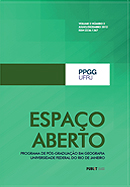The Daesh and the Refugee Crisis in Syria and Governmental Xenophobia in Europe
DOI:
https://doi.org/10.36403/espacoaberto.2018.15007Keywords:
Daesh, Refugees, Xenophobia, EuropeAbstract
In order to contribute to the debate on the refugee crisis of the second decade of the Twenty-first Century, this paper has the aim of reflecting on the role of the fundamentalist group Daesh (also known as the Islamic State – IS) in the crisis. The influence of Western powers in the rise, consolidation and strengthening of the Daesh is related to territorial expropriation in north Africa and the Middle East, especially in Syria, from where most of the thousands of displaced persons originate and go to Europe by way of the dangerous crossing of the Mediterranean Sea. The arrival of these displaced people is shown to give rise to European xenophobic sentiment. The views presented in this work are based on bibliographical research concerning the Islamic State, xenophobia and refugees. The article is organized in the following way: first, the rise and performance of the Daesh as well as the forces that fight against it is treated in regard to its effects on the international scene; then, the context of the production of refugees due to expropriation is presented; and finally, a brief trajectory of recent xenophobic sentiments in European countries is outlined.Downloads
Download data is not yet available.
Downloads
Published
2018-12-22
How to Cite
MENDES FELÍCIO, Luís Felipe. The Daesh and the Refugee Crisis in Syria and Governmental Xenophobia in Europe. Espaço Aberto, Rio de Janeiro, Brasil, v. 8, n. 2, p. 77–92, 2018. DOI: 10.36403/espacoaberto.2018.15007. Disponível em: https://revistas.ufrj.br/index.php/EspacoAberto/article/view/15007. Acesso em: 19 dec. 2025.
Issue
Section
Articles
License
The copyright of articles published in Espaço Aberto belong to their respective authors with rights to first publication conceded to the journal. Every time that the article is cited and reproduced in institutional repositories or personal and professional web pages the link to the journal web page must be provided. The articles are simultaneously licensed under the Creative License Commons BY-NC-SA 4.0.



